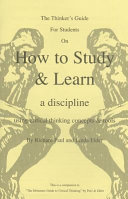(Ebook) The Thinker's Guide for Students on how to Study & Learn a Discipline Using Critical Concepts & Tools by Richard Paul, Linda Elder, Foundation for Critical Thinking ISBN 9780944583111, 0944583113
This thinker's guide contributes toward making intellectual work and deep learning more manageable, practical, and intuitive. Its goal is to foster lifelong learning and the traditional ideal of a liberally educated mind: a mind that questions, probes, and masters a variety of forms of knowledge, through command of itself, intellectual perseverance, and the tools of learning. In this guide we suggest a variety of strategies for becoming not just a better student but a master student. This thinker's guide is designed not only for students but also for administrators and faculty, to remind us all of the essence of what it is to study academic subjects with discipline. It does not aim to take the intellectual work out of learning--for this would be an insult to the intelligence of our readers. It contributes, rather, toward making intellectual work and deep learning more manageable, practical, and intuitive. Its goal is to foster lifelong learning and the traditional ideal of a liberally educated mind: a mind that questions, probes, and masters a variety of forms of knowledge, through command of itself, intellectual perseverance, and the tools of learning. It respects equally the traditions of John Henry Newman, Bertrand Russell, and Albert Einstein. It does not answer all questions, but rather puts all questions into a clear perspective. It emphasizes that all bona fide fields of study share common intellectual structures and standards of reasonability. It emphasizes that foundational intellectual structures and standards of reasonability are worth learning explicitly and in themselves, since they help us more deeply interconnect and understand all that we learn. It also emphasizes foundational intellectual dispositions and values that define the traits of the disciplined thinker in all fields: intellectual autonomy, intellectual humility, intellectual integrity, intellectual perseverance, intellectual empathy, confidence in reason, and fair-mindedness. On every…
*Free conversion of into popular formats such as PDF, DOCX, DOC, AZW, EPUB, and MOBI after payment.


